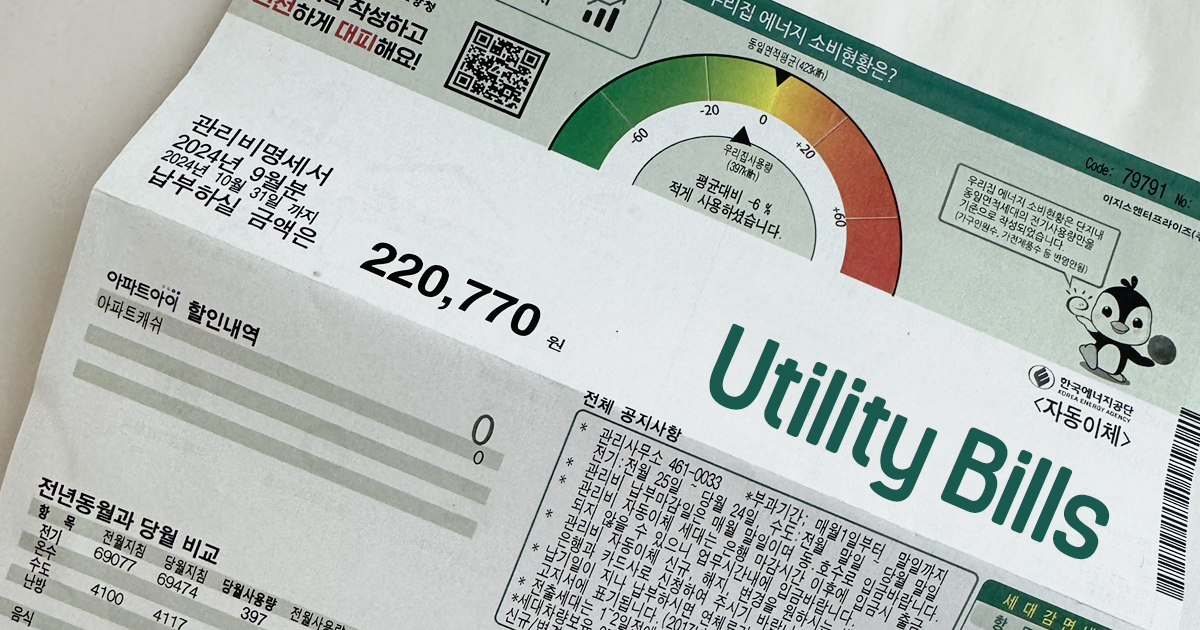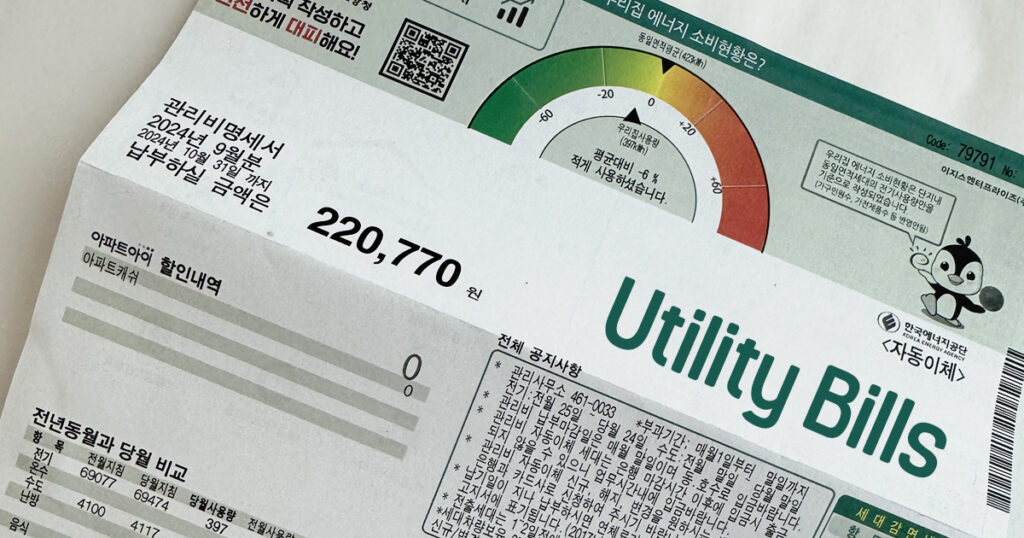Complete Guide to Essential Utility Bills in Korea
If you live in Korea, whether as a citizen or a foreign resident, you will need to regularly pay various utility bills. These bills are categorized as essential living expenses and are usually charged monthly. Below is a detailed guide on the main types of utility bills in Korea and how to pay them. 🙂
1. What Are Utility Bills?
Utility bills refer to costs charged by the government or public institutions for providing public services. Generally, they are recurring monthly expenses, often referred to simply as “utility bills.”
2. Prepare a Payment Account for Utility Bills
To pay utility bills in Korea, having a bank account is essential.
– Opening a Bank Account: Bring your Alien Registration Card (ARC) and passport to the nearest bank to open an account.
reference article [Korea Foreigner Bank Account: How to Set Up Your Bank Account Easily]
– Register for Auto-Debit: After opening a bank account, set up auto-debit for your utility bills to conveniently manage payments and avoid missing deadlines.
3. Electricity Bill (전기세)
This is the cost incurred for electricity usage.
- Billing Cycle: Monthly
- Billing Organization: Korea Electric Power Corporation (KEPCO)
- Pricing Structure:
- A progressive rate system applies, meaning the more electricity you use, the higher the rate.
- Summer (July–August) and winter (December–February) typically see higher usage and higher bills.
- Payment Methods: Bank auto-debit, internet banking, or at convenience stores.
4. Water Bill (수도세)
This is the cost for the usage of water supply and sewerage services.
- Billing Cycle: Monthly
- Billing Organization: Regional water service offices
- Pricing Structure:
- Charges depend on water usage.
- In some regions, water supply and sewerage fees are combined.
- Tip: Water bills are relatively inexpensive, but reducing water usage can lead to greater savings.
5. Gas Bill (가스요금)
This covers the cost of city gas used for heating, cooking, and more.
- Billing Cycle: Monthly
- Billing Organization: Local city gas suppliers
- Pricing Structure:
- Charges depend on the usage of city gas, commonly for heating, hot water, and cooking.
- Bills can rise significantly during winter due to heating use.
- Payment Methods: Similar to electricity bills – auto-debit or payment at convenience stores.
6. Internet and Communication Fees
This includes the costs for internet, mobile phone, and IPTV services.
- Billing Cycle: Monthly
- Billing Organizations: Providers like KT, SK Broadband, LG U+, etc.
- Pricing Structure:
- Includes fees for internet, TV, and mobile phone services.
- Bundled packages can help reduce costs.
7. Maintenance Fees
These are charges for the maintenance of shared facilities in apartments or communal housing.
- Billing Cycle: Monthly
- Billing Organization: Property management offices or leasing companies
- What’s Included:
- Common electricity, elevator maintenance, cleaning fees, and security fees.
- In some cases, heating and water charges may also be included.
8. TV License Fee
This is a fee for using public broadcasting services (KBS).
- Billing Cycle: Monthly
- Billing Organization: KBS
- Cost: Approximately 2,500 KRW
- Special Notes:
- Often included in the electricity bill.
- If you don’t own a TV, you can request cancellation (requires separate application).
- Visit the Korea Electric Power Corporation (KEPCO) customer center (dial 123 without an area code) or a local branch to apply.
9. Other Living Expenses
- Insurance Premiums: Includes health insurance and the national pension scheme, both of which are mandatory for long-term foreign residents.
- Garbage Disposal Bags: You need to purchase designated trash bags in your area.
How to Efficiently Manage Utility Bills
- Set Up Auto-Debit: Use your bank app or internet banking to set up auto-debit and avoid missing payment deadlines.
- Conserve Energy: Reduce electricity, gas, and water usage to lower costs.
- Use Mobile Apps: Check real-time usage through apps provided by utility companies (e.g., KEPCO, local gas providers).
Since utility bills are recurring monthly expenses, it’s important to monitor your usage and find ways to save. For any questions or issues, foreign residents can seek assistance from Korea’s foreigner support centers or customer service centers of the respective utility companies.
– Foreigner Support Center: Provides consultation services for foreign residents in Korea regarding utility bill payment methods. (Phone: 1345)
– Individual Institution Customer Centers: Offers detailed information on utilities such as electricity, gas, and water at the respective institution’s customer service centers.
– Language Support: Major utility service providers offer multilingual support in languages such as English, Chinese, and more.
Let’s read other blog posts together!
[Starting Life in Korea 1] Getting Your Alien Registration Card (ARC)
[Starting Life in Korea 2] Korea Foreigner Bank Account: How to Set Up Your Bank Account Easily
[Starting Life in Korea 5] Registering Your Move-in as a Foreigner


